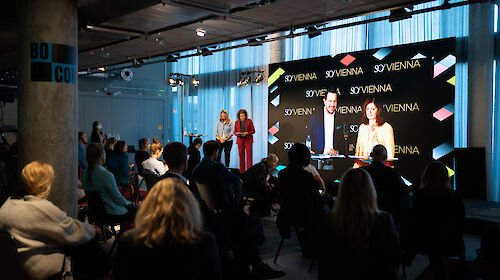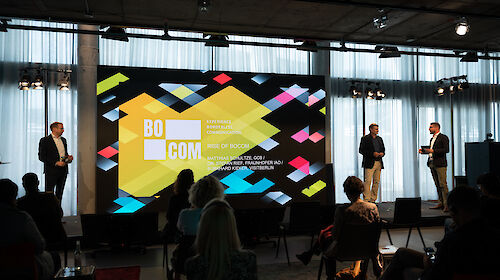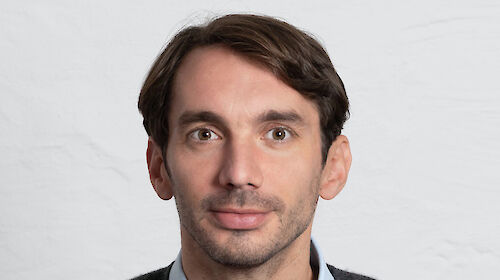“We will be seeing new formats, services and business models”
GCB FutureTalks #8 with Stefan Rief
 © Stefan Rief / Fraunhofer IAO
© Stefan Rief / Fraunhofer IAO
As head of the Organizational Development and Work Design Research Department at the Fraunhofer Institute for Industrial Engineering (IAO) in Stuttgart and within the framework of the innovation network Future Meeting Space, a cooperation with the GCB German Convention Bureau, Stefan Rief's work includes dealing with the challenges and future scenarios of the MICE industry. In an interview with Matthias Schultze, he gave valuable insights into the profound changes during the crisis and the future use of virtual tools.
Matthias Schultze: What is your take on the ongoing corona pandemic and its economic consequences?
Stefan Rief: The ongoing corona pandemic is without precedent for our generations. After more than ten years of steady economic growth, increasing internationalization and rising prosperity in almost all parts of the world, our economies are virtually at a standstill.
Of course, the MICE industry is particularly affected. It depends on people coming together. Therefore, it suffers greatly from the current restrictions on travel and everyday life. On top of that, no one can seriously predict when the pandemic will be overcome or how quickly the economy and society will recover.
Matthias Schultze: What impact does the current digitalization-boom have on society and future meetings?
Stefan Rief: I am sure that this crisis will launch the MICE industry into a new era. Millions of people are learning to use virtual tools in a crash course from home. This changes the way we communicate. On the one hand, this is due to an increased need for swift coordination within organizations. On the other hand, we are also learning new ways of creating virtual customer relations.
Furthermore, we take advantage of our daily travel or commute time savings to communicate with our colleagues and customers and are seeing the benefits of the easy and spontaneous availability of our contacts. Of course, nobody wants to remain in this extremely distributed work situation for long or even permanently. In fact, I am sure that once the pandemic is over, we will experience an increased, yet short-term, need for personal contact. However, as this situation goes on, we will see an increasing number of these new digital elements remain integrated in our future work and living environments.
Matthias Schultze: What consequences would this have on the post-corona MICE industry?
Stefan Rief: In order to answer this question, I would like to put forward six theses:
- Both the number and quality of free virtual seminars and conferences will increase massively.
- In 2015 our research initiative Future Meeting Space had already identified the short-term nature of current topics as a main requirement for future events. Therefore, the ability to present current topics at very short notice will increase the pressure on face-to-face events.
- Attendees’ willingness to pay for traditional face-to-face events is decreasing. Economic losses resulting from the current crisis will exacerbate this development.
- Many people are getting accustomed to the use of virtual tools. This will also be reflected in future event formats.
- The economy’s restart and the necessary re-organization of business models, products and services in certain sectors will tie up resources. Thus, many potential participants may no longer have time for conferences with time-consuming travel.
- But not everything is going to change: People will always want to meet in real life.
Matthias Schultze: How far-reaching do you expect the changes in the MICE industry to be?
Stefan Rief: The MICE industry is undergoing massive changes – just as the media has been experiencing for years due to the rise of online offers. This will push the meetings industry’s leap into the future. Whilst people will continue to meet, we will be seeing new formats, services and business models. In order to remain successful, the industry will have to put customers’ and participants’ needs in the spotlight. Ultimately, they are the ones making conscious decisions about what they want to spend their valuable time on in the future.
Matthias Schultze: What do you expect future events to look like?
Stefan Rief: I definitely expect hybrid formats, i.e. the mixture of virtual and real elements of an event, to play a much greater role. Virtual formats can enable the integration of top-class speakers for current topics on short notice. On top of that, numerous small but virtually connected event locations would make it possible for experts and participants to save time and money on traveling whilst still providing them with complete access to the events.
Matthias Schultze: What other changes do you envision for future events?
Stefan Rief: The wish for current information will continue to play a major role. Platforms on which event organizers and planners can view, compare and directly reserve the availability and prices of locations, services or artists will accelerate the preparation of events, for example.
Furthermore, revenue models will also undergo change: why not pay for a private chat with a top expert or consider variable participant fees depending on the rating of an event? It may also become more relevant for potential attendees to see who else has already registered for an event.
There are no limits to creativity. In fact, it is urgently needed in order to overcome the crisis and to assert oneself. Whilst change will not be easy for everyone, it does provide many opportunities. I am looking forward to the future, but I am still looking forward to attending real events every now and then.
 ©
© ©
© ©
© ©
©